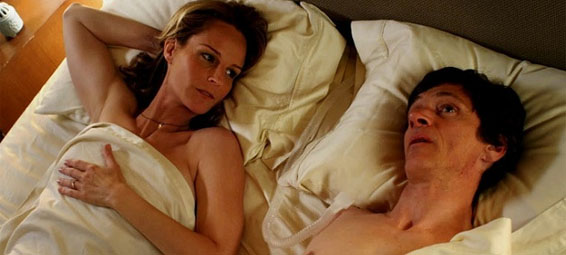Ben Lewin’s starkly honest and surprisingly moving sex comedy, The Sessions, tells the true-life story of Mark O’Brien, a man paralyzed by polio in his youth, and his awkward and reluctant fumbling towards discovering sex. Even without the salacious experiment that is the center of the film, O’Brien’s story is a remarkable one. Living on a gurney during the day and in an iron lung at night, he earned a degree in literature from Berkeley in the 1970s with a stick in his teeth typing out his assignments one letter at a time. After graduation, he remained in Berkeley, living in a small bungalow frequented round-the-clock by nurse attendants. Though his life is unsettlingly fragile (Mark cannot survive very long outside his iron lung), what he has accomplished while living prostrate on a rolling bed is incredible. He writes poetry and columns for a local newspaper. Trapped in a useless body, his soul manages far-flung mystic travels.
An off-beat assignment from his editors, however, throws Mark into a crisis of body and soul. They want Mark to write a column about sex and the handicapped. As he begins his research, Mark discovers some unusual and quirky details about the sex lives of various people living with disabilities. But Mark cannot get over his own inadequacy dealing with the subject. Paralyzed since adolescence (but wired and working, eh hem, down there) he has never had sex. He begins to wonder what exactly that means – and the man who has spent his life trying to realize the fullness of his humanity despite a severe disability wonders what missing out on this one, significant aspect of life means.
Mark is played by the inestimable John Hawkes, who is rapidly establishing himself as one of the finest American actors working today. While his haggardly appearance has often lent him to villainous or psychopathic characters, here he whips up a sensitive and fragile portrayal that balances impetuousness, impatience, bitterness, and charm. Hawkes is emaciated, and its one of those performances that requires such physical exertion that it is hard not to imagine at least a nod towards Hawkes come awards season. But as a performance, what is remarkable is its tremendous restraint. A film about sex, The Session’s real dramatic fireworks happen inside Mark O’Brien’s well-hidden rumblings. Hawkes’ challenge is not merely to act with only his face to animate, but also to continually offer and withhold his character.
To remedy his, um, issue, Mark finds Cheryl a therapist who specializes in sexual encounters with handicapped clients. A steely, coveted personality, Cheryl tries to maintain a detached emotionality towards her clients, but that professional protocol is challenged by the tender relationship that begins to unfold between Mark and Cheryl. Some sensitive viewers may find the prolonged sex scenes too graphic, but their rawness is necessary to Lewin’s seeming aim, a consideration of the mingling of stark physical and emotional realities. To a large extent because of these scenes, The Sessions’ strongest quality becomes its restraint, which transforms the weekly sexual encounters between Cheryl and Mark into a complex blending of affection, mothering, and nurturing.
What detracts from Lewin’s accomplishment, however, is the movie’s marked sentimentality, which is counterbalanced by the sincerity of the two lead’s accomplished performances. This is most apparent in the scenes shared between Mark and William H. Macy’s Father Brendan, a floppy-haired liberally-minded Catholic priest who unofficially signs off on Mark’s out-of-marriage sexual experimentations and then perhaps takes too much pleasure in hearing about their lurid details.
As a dramatic trope, there is potential here. Mark’s devout religious convictions are challenged by his desire for expanding his experience, and Father Brendan’s celibacy in light of Mark’s explorations, renders him an inadequate, but oddly ideal, confidant. But the scenes with Father Brendan are too hammy, stooping for jokes that add levity but scatter the film’s focus. Likewise, Mark’s nurse Vera (Moon Bloodgood) enjoys goofy conversations with a motel clerk (Ming Lo) during “the sessions,” and the scenes playing too much like a sitcom-y interlude, while unnecessarily tossing murky and potentially offensive stereotypes about Asian sexuality into an otherwise sensitive mix.
These bits keep The Sessions from being a truly great movie, but in our age of hyper-sexualized entertainment and advertising, the movie’s main accomplishment is significant enough. Without moral – or amoral – equivocating, The Sessions re-centers the sexual conversation, exploring the boundaries between with sex and love, emotion and pain, presenting a difficult tangle of responsibilities and affections. And given the number of wet eyes there were exiting the movie theater after the screening I attended, the movie may also prove to be the sleeper indie hit of the fall.





